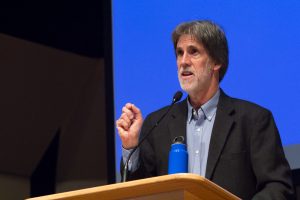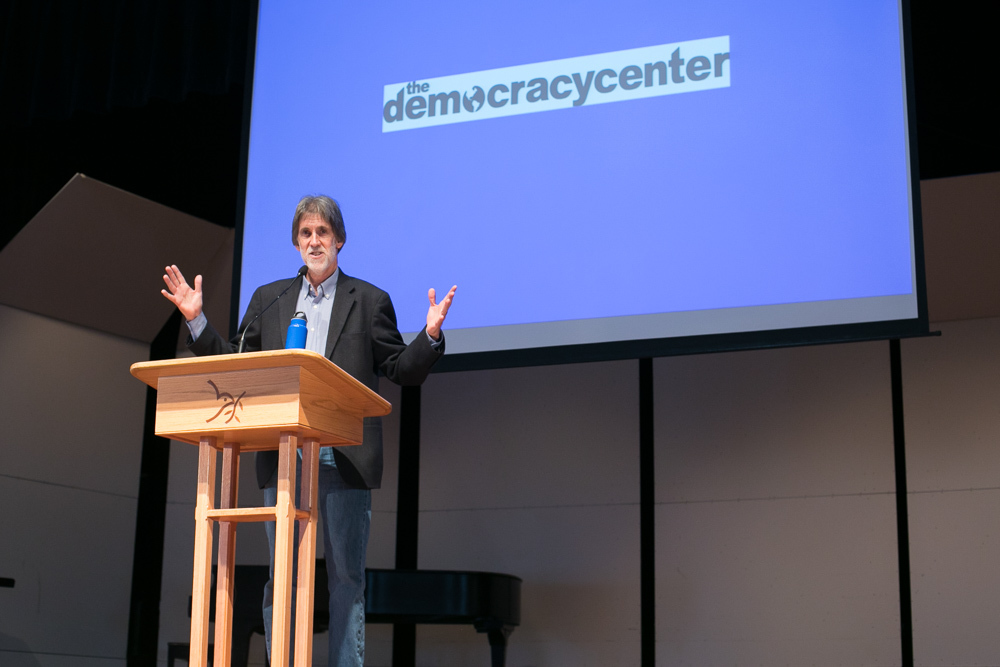Just days after the United Nations Intergovernmental Panel on Climate Change released a report detailing the anticipated impacts of global warming, Jim Shultz visited Eastern Mennonite University with a very clear message for students and their peers everywhere:
“You are, in a very strange way, the chosen people,” he said in a convocation address: “You are the very first generation in 10,000 generations of humanity to be born into a planetary crisis. Whether you like it or not, this crisis is going to shape and frame the entirety of your life.”
Shultz is the executive director of the Democracy Center, which he founded in 1992. It uses research and analysis, activism, training and support “to strengthen struggles for social, economic and environmental justice,” according to its website.
A long-time activist first in California and now around the world, Shultz lived for two decades in Bolivia, where last year he met “to engage and challenge” EMU students on cross cultural, said Linda Martin Burkholder in convocation opening remarks.

And last week, just as the nation was grappling with the U.N. report, Shultz came to campus.
The crisis – and the good news
Eleven years, Shultz said. That’s how long humanity has “to rapidly alter” its use of fossil fuels and conduct agriculture before climate change is “locked in.”
Already it has fired starting salvos:
“We get flooding. We get biblical-level fire seasons in California. We get droughts. We get heat waves,” Shultz said. “What we are seeing right now is just the preview of coming attractions; we have entered the time in which we are no longer dealing with the theory of climate change; we are dealing with the opening act of climate change.”
The many refugee crises right now will be dwarfed in a handful of decades, he said.
“What happens in 40 and 50 years – or less – when the whole parts of the Persian Gulf become so hot and humid that it becomes impossible for human survival for more than 90 minutes outside?” Or, he asked, when drought collapses rural economies in Central America?
Not the warm welcoming of refugees, he fears: “We’re not going to be debating at that point whether to build a wall with Mexico. We’re going to be debating whether to put gun turrets on the wall,” he said.
“These are not alarmist projections,” he said. “These are projections based on where we are headed, and we need to pay attention to them” – which thus far is not happening. “My generation is not dealing with this. My generation is screwing around, and they are not paying attention, and it’s your future that’s on the line.”
But there’s good news, he said: Humanity knows why what’s happening is taking place, and what to do about it.
To do
Shultz sees three options for responding to climate change:
- Option 1: Ignore the warnings, even though the Oct. 6 U.N. report is “like a deafening, piercing smoke alarm going off in the kitchen,” said Erik Solheim, executive director of the U.N. Environment Program in a Washington Post article.
- Option 2: Shield yourself from it “in the way that we can use affluence to shield ourselves in gated communities,” Shultz said. (Already, he said, “there is almost in a directly inverse relationship between the amount of blame you bear for causing the crisis and the amount of impact on you.”)
- Option 3: Take action.
But personal, voluntary changes will not be enough, Shutz said. Rather, “we have to alter the behavior of billions of people on this planet in deep ways, wicked fast.”
That will require changes in policy – new laws to “alter what economists call ‘the choice architecture around us,’” he said – and the intentional use of “one of the most valuable and significant tools that we have”: democracy.
The Democracy Center’s definition of democracy is “that every human being has a right and a responsibility to understand the public issues around them … and a responsibility to take action to change the world,” he said.
So find your talents and marry them to your passions, he told the students, and do something creative, all ideas welcome for consideration – because “if your generation doesn’t bring a sense of urgency to this and a demand for action, nothing is going to change.”
After all, he said, “when the science fiction stuff starts to kick in, I’ll be dead, and you won’t be.”

Thank you again EMU students and faculty for having me and especially for the smaller discussions we had over the course of the day. You give me hope.